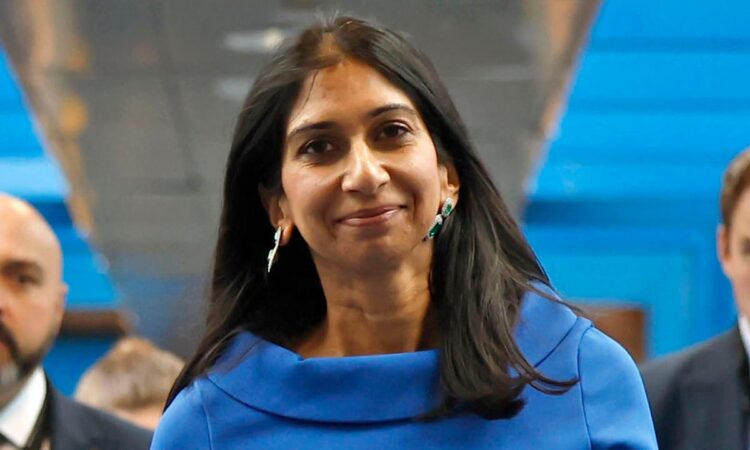
Most British people believe the Rwanda asylum deal will fail to reduce small boat crossings and will be a waste of public money, polling suggests.
Research by Ipsos for the British Future think-tank indicated warming attitudes towards migration in the UK, with only a minority of people now calling for overall immigration to be cut.
It suggests that the position currently taken by the new home secretary Suella Braverman is at odds with the majority of the British public and a substantial portion of Conservative voters.
Asked whether the Rwanda agreement would reduce the number of asylum seekers attempting to enter the UK without permission, only 36 per cent of people thought it was very likely or likely to achieve that aim, while 52 per cent of people said it would not and 12 per cent were undecided.
Tories were more likely to place hope in the scheme, but 43 per cent still said it was not very likely or “not at all likely” to reduce Channel crossings.
Yvette Cooper, the shadow home secretary, said: “People can see the Rwanda deal for what it is, an unworkable, unethical and completely extortionate plan that will cost the taxpayer hundreds of millions and which ends up targeting torture victims rather than trafficking gangs.
“Labour would stop the Rwanda deal and put the money into a new major cross border unit to crack down on the criminal gangs that are driving Channel crossings.”
The deal has not been put into practice six months after it was struck by Priti Patel, with High Court judges deciding on two legal challenges after the first attempted flight was grounded by a wave of last-minute appeals.
Following an up-front payment of £120m to the Rwandan government, ministers have refused to say how much it will cost to send migrants to the country and fund their asylum processing and accommodation.
The polling showed that only a quarter of the overall public and 38 per cent of Conservative supporters believe the scheme is likely to provide value for money.
Overall, 40 per cent of people said they supported the Rwanda agreement and a third were opposed, with the rest undecided or saying they didn’t know.
The proportions are similar to previous YouGov polling, which has seen the balance flip between both positions. It indicated that in April, 35 per cent of Brits were in support of the Rwanda deal and 42 per cent opposed, but by June the numbers had shifted to 44 per cent for and 40 per cent against.
Suella Braverman says seeing a plane taking off to Rwanda is ‘her dream’
British Future said its research indicated that most people were concerned about the record number of small boat crossings in the English Channel, but they are not “convinced that the Rwanda scheme is the answer”.
Director Sunder Katwala said the debate was “polarised” but added: “There is no public majority in support of the Rwanda scheme as the answer: most people think it will be ineffective and a waste of money.”
When questioned on other potential responses to Channel crossings, 45 per cent of people backed creating alternative ways for people to make a UK asylum application from outside the country, for example with a new visa or by allowing applications at some embassies.
Under British law, people must be present on British soil to claim asylum, and there is no visa for those journeying to the country for that purpose.
While home secretary, Ms Patel rejected calls to reduce the demand for people smugglers by screening applications in France and transporting selected asylum seekers safely to England.
Polling also indicated that six in 10 people supported agreements allowing the return of rejected asylum seekers after an EU-wide transfer deal was lost during Brexit.
People were asked about their attitudes to wider immigration, amid a reported rift between the home secretary and prime minister over numbers.
Ms Braverman told a media event at the Conservative Party conference that she wanted to “get net migration down” last week, but then said in her main speech that she would “deliver the kind of migration that grows our economy”.
Liz Truss is said to be planning to relax some immigration rules to fill selected jobs in order to boost the floundering economy.
(British Future)
The Ipsos polling showed support for reducing overall immigration at its lowest level since its tracker survey began in 2015, with only 42 per cent of people saying they wanted it cut and a quarter wanting an increase. Only 29 per cent of Conservative supporters support reducing student migration.
A significant portion of Brits said they would back an increase for people coming to the UK to work as seasonal fruit and vegetable pickers, care workers, doctors and nurses.
Ms Braverman has taken aim at the level of migration to study at British universities, but only one in five people said they wanted to reduce international student numbers.
British Future said the findings “reflect the gradual warming of public attitudes to immigration since the run-up to the EU referendum” in 2016.
Mr Katwala added: “Overall numbers matter less to the public now: their priority is that immigration is controlled, rather than reduced.
“They inherit a less heated immigration debate as a legacy of Boris Johnson’s ‘control not reduce’ approach.”
Ipsos interviewed a representative sample of 3,004 adults online across Great Britain between 19 July and 3 August, weighting the data to reflect the population profile.
A Home Office spokesperson said: “We have repeatedly made clear that there is no one single solution to stop the increase in the dangerous small boat arrivals that is pressurising our asylum system.
“We are confident that once our world-leading partnership with Rwanda is operational, combined with other measures, it will have the desired effect of deterring illegal migration. We remain committed to this policy.”






